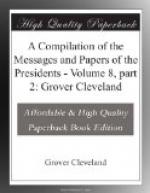The problem of establishing such water communication has long attracted attention. Many projects have been formed and surveys have been made of all possible available routes. As a knowledge of the true topical conditions of the Isthmus was gained, insuperable difficulties in one case and another became evident, until by a process of elimination only two routes remained within range of profitable achievement, one by way of Panama and the other across Nicaragua.
The treaty now laid before you provides for such a waterway through the friendly territory of Nicaragua.
I invite your special attention to the provisions of the convention itself as best evidencing its scope.
From respect to the independent sovereignty of the Republic, through whose cooperation the project can alone be realized, the stipulations of the treaty look to the fullest recognition and protection of Nicaraguan rights in the premises. The United States have no motive or desire for territorial acquisition or political control beyond the present borders, and none such is contemplated by this treaty. The two Governments unite in framing this scheme as the sole means by which the work, as indispensable to the one as to the other, can be accomplished under such circumstances as to prevent alike the possibility of conflict between them and of interference from without.
The canal is primarily a domestic means of water communication between the Atlantic and Pacific shores of the two countries which unite for its construction, the one contributing the territory and the other furnishing the money therefor. Recognizing the advantages which the world’s commerce must derive from the work, appreciating the benefit of enlarged use to the canal itself by contributing to its maintenance and by yielding an interest return on the capital invested therein, and inspired by the belief that any great enterprise which inures to the general benefit of the world is in some sort a trust for the common advancement of mankind, the two Governments have by this treaty provided for its peaceable use by all nations on equal terms, while reserving to the coasting trade of both countries (in which none but the contracting parties are interested) the privilege of favoring tolls.
The treaty provides for the construction of a railway and telegraph line, if deemed advisable, as accessories to the canal, as both may be necessary for the economical construction of the work and probably in its operation when completed.
The terms of the treaty as to the protection of the canal, while scrupulously confirming the sovereignty of Nicaragua, amply secure that State and the work itself from possible contingencies of the future which it may not be within the sole power of Nicaragua to meet.




